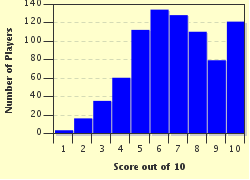Quiz Answer Key and Fun Facts
1. Cotard's syndrome is a very rare mental disorder that leaves the patient with which of the following beliefs?
2. Which of the following is a temporary psychological disorder that is experienced by Japanese (usually) tourists?
3. Muscle dysmorphia, which is the belief that one is not muscular enough, is also known by which of the following terms?
4. A patient suffering from the syndrome known as Koro believes which body part is shrinking and will disappear?
5. Boanthropy is a psychological disorder in which the patient believes he is which type of animal?
6. Progeria is the belief by an adult that they are actually still a child.
7. Wendigo psychosis is a disorder found in which group of people?
8. Which of the following is a compulsive disorder in which the sufferers feel compelled to pull out their hair?
9. Which of the following options best describes the disorder known as synesthesia?
10. Folie a Deux is a rare psychiatric disorder in which two people share a psychosis.
Source: Author
dcpddc478
This quiz was reviewed by FunTrivia editor
CellarDoor before going online.
Any errors found in FunTrivia content are routinely corrected through our feedback system.

